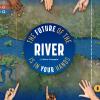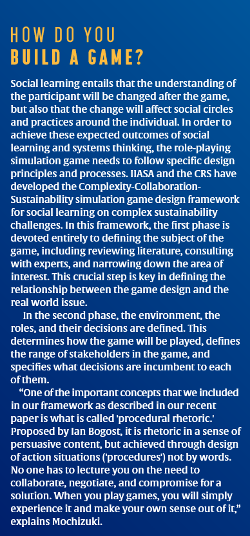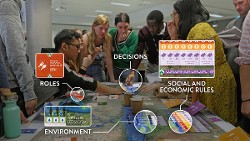
Options Winter 2021: IIASA research highlights role-playing simulation games as a promising approach to engage stakeholder of sustainable development across sectors in systems thinking and societal understanding of environmental challenges.
For the past decade, IIASA researchers Piotr Magnuszewski and Junko Mochizuki have been reviving the long-standing IIASA tradition of creating interactive modeling games.
“What we are doing particularly differently now as compared to decades ago, is that we have a lot more opportunities to use this type of approach on
the ground with policymakers and practitioners. We are using this not only as an opportunity to provide a space for non-scientists to learn about systems thinking, but also for us to learn about collective decisions and to explore ways in which we can better design models within decision- and policymaking processes,” says Mochizuki, about the water-food-energy Nexus Game.
In the Nexus Game, players take on the role of key ministers of two countries sharing the same river. After receiving a short introduction and a briefing note from a fictitious superior, they find themselves immersed within a realistic world environment and tasked with solving a resource management problem. Every player has to make decisions that impact others and the game in direct and measurable ways.
“We are getting players in a situation where, by compressing time and space, they experience the most important system interconnections. Then they reflect on the game dynamics, but we also make a bridge to the real world situation to which they can relate,” says Magnuszewski.
 © IIASA
© IIASA
Unlike many games, these social simulations have no winners or losers. Instead, the design and process developed by Mochizuki and colleagues are based on alternating active and reflexive phases that incorporate a balanced mix of actions and observations, as well as abstract concepts and concrete experiences. By applying the concepts of experiential learning pioneered by David Kolb, the game becomes an opportunity for each player to experience and contribute to social learning that lasts beyond the game session itself. In their feedback, participants report better understanding an overall system perspective in complex problems, a greater grasp of the importance of collaboration, including the wide network of stakeholders involved and, finally, a high level of personal engagement and fun.
The benefits of the Nexus Game have been integrated as a tool in research projects that equire stakeholder engagement and collaboration. Stakeholders of the Zambezi and Indus river basins, for example, had the opportunity to play the Nexus Game as part of the Integrated Solutions for Water, Energy, and Land (ISWEL) Project. The players were able to relate the real world challenges of managing their local water, food, and energy resources to the policy exercise offered in the game. Policymakers, researchers, and students benefited from the game as an educational experience, relationship-building activity, and as a capacity building exercise, preparing the participants for the upcoming stakeholder workshops.
The Nexus Game was created in collaboration with the Centre for Systems Solutions (CRS). IIASA researchers and the CRS team have created a range of games tackling sustainability challenges, such as risk and resources management, that are all focused on the importance of systems thinking. Although more research is required to fully understand the extent of the impact of these games on policy, it appears that by walking the participants through the process of the game, researchers are able to broaden their scope of understanding. These games create a space for deliberations in which responsibilities are shared in the decision-making process, thus supporting more engaging and participatory research to policy practices.
 © IIASA and CRS
© IIASA and CRS
“I think for the kind of issues that IIASA studies, knowing more' is no longer sufficient, so we are focusing on how we can facilitate more 'doing and experimenting' for solutions,” concludes Mochizuki.
By Marie Franquin

